- Home >
- Research and Innovation >
- Technology transfer >
- Areas of expertise >
- R&D offer: Medical Technologies
R&D offer: Medical technologies

Medical technologies represent a heterogeneous range of products and services covering a very broad therapeutic and operational field: imaging analysis, diagnostics and biochips, software tools and surgical robotics, instrumentation and sensors, implants and prostheses, "e-health" supports for autonomy, and so on.
Hospital Group
Surgical oncology
At Institut Curie, doctors perform conservative or reconstructive surgery whenever possible. Improved surgical techniques promote early recovery, reducing hospital stays and the number of outpatient procedures.
Anaesthesia, resuscitation and pain
The department is a benchmark for the application of intravenous devices, specializing in the implantation of ports in children and adults, and in the management of chronic pain.
Medical imaging
Institut Curie aims to contribute to the continuous progress of diagnostic and therapeutic strategies in terms of efficacy, safety and cost.
Radiotherapy and radiobiology
As the cradle of radiotherapy for over 100 years, Institut Curie has always been at the forefront of innovation in this field, with one of Europe's most advanced technical facilities on its Orsay site at the heart of the Université Paris Saclay.
Research Center
Imaging and microscopy
Institut Curie seeks to discover the role of physical laws in the architecture and functions of cellular systems. To this end, it favors cross-disciplinary approaches involving physics, chemistry and biology. Institut Curie also boasts sophisticated equipment and cutting-edge technologies in the field of advanced microscopy.
Microfluidics & "lab-on-a-chip
Institut Curie is developing several innovative technologies based on its expertise in complex fluids and soft matter: magnetic and convective self-assembly, flow control, unconventional microfabrication strategies and surface treatments, high-droplet microfluidics.
Institut Curie is a founding member of the Institut Pierre-Gilles de Gennes (IPGG), which brings together experts in microfluidics research from different disciplines, and develops both fundamental and applied research.

